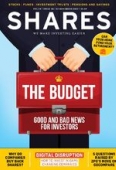Archived article
Please note that tax, investment, pension and ISA rules can change and the information and any views contained in this article may now be inaccurate.
Lower living costs and higher wages centre stage at this year’s Budget

Chancellor Philip Hammond was very upbeat in his Budget statement despite downgraded OBR forecasts for the UK economy. Productivity growth and business investment estimates were also revised down.
UK GDP is now expected to grow by 1.5% in 2017 (previously estimated at 2%), 1.4% in 2018 and 1.3% in both 2019 and 2020 – before picking up to 1.5% in 2021 and 1.6% in 2022.
From a personal finance perspective, positive news includes a prediction that the annual rate of CPI inflation would peak at 3% in the current quarter and progressively fall to the Bank of England’s 2% target over the next year.
The National Living Wage will increase by 4.4% to £7.83 from April 2018. That is good for workers but bad news for companies with large staff numbers including retailers who are already under pressure from difficult trading conditions.
The Government says its Budget will reduce costs of living as well as boost wages. From April 2018, it will increase the personal allowance to £11,850 from £11,500 which is the amount you can earn before paying income tax. The Government had already pledged to lift the personal allowance to £12,500
by 2020/21.
The threshold at which the 40% higher rate of tax is applicable will increase in April 2018 to £46,350 from £45,001. The Government says this change will result in a typical taxpayer paying at least £1,075 less tax than in 2010/11.
The headline annual ISA contribution limit will stay the same at £20,000. However, anyone saving into a Junior ISA will benefit from a higher annual subscription limit of £4,260 versus the current £4,128 level.
Stamp duty has been immediately abolished for anyone buying their first home worth up to £300,000. In higher price locations such as London first time buyers won’t pay stamp duty on the first £300,000 for properties worth up to £500,000. The Government says 80% of first-time buyers will pay no stamp duty at all as a result of this rule change.
Enterprise Investment Scheme (EIS) investment limits will be doubled for technology and other ‘knowledge intensive’ sectors, while ensuring that EIS is not used as a shelter for low-risk capital preservation schemes.
Finally, a freeze on short-haul air passenger duty is welcome to people who like to holiday abroad. Long-haul duty will also be frozen for economy passengers.
Yet it isn’t good news for anyone who flies premium economy, business or first class as duty will increase by £16 or an extra £47 for anyone travelling by private jet. Yet let’s face it, if you can afford a private jet the extra duty charge is hardly going to break the bank. (DC)
Important information:
These articles are provided by Shares magazine which is published by AJ Bell Media, a part of AJ Bell. Shares is not written by AJ Bell.
Shares is provided for your general information and use and is not a personal recommendation to invest. It is not intended to be relied upon by you in making or not making any investment decisions. The investments referred to in these articles will not be suitable for all investors. If in doubt please seek appropriate independent financial advice.
Investors acting on the information in these articles do so at their own risk and AJ Bell Media and its staff do not accept liability for losses suffered by investors as a result of their investment decisions.
Issue contents
Big News
- The winners and losers on the stock market from Hammond’s Budget
- Lower living costs and higher wages centre stage at this year’s Budget
- What's going on with Royal Mail?
- Accrol: back and kicking up a stink
- Black Friday to bring further retail woe
- EasyJet takes advantage of rivals’ struggles
- Worldwide dividends surge in record high third quarter
- New clean energy fund heading to the market with 4.5% yield
- Ocado growth story turning sour
- Boku hopes to make its mark

 magazine
magazine








